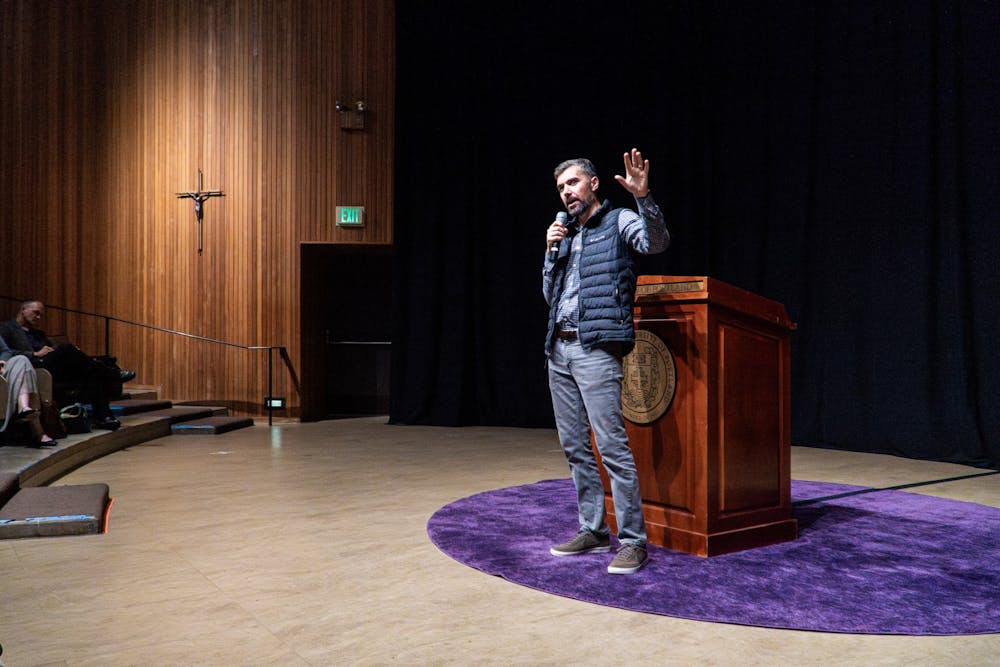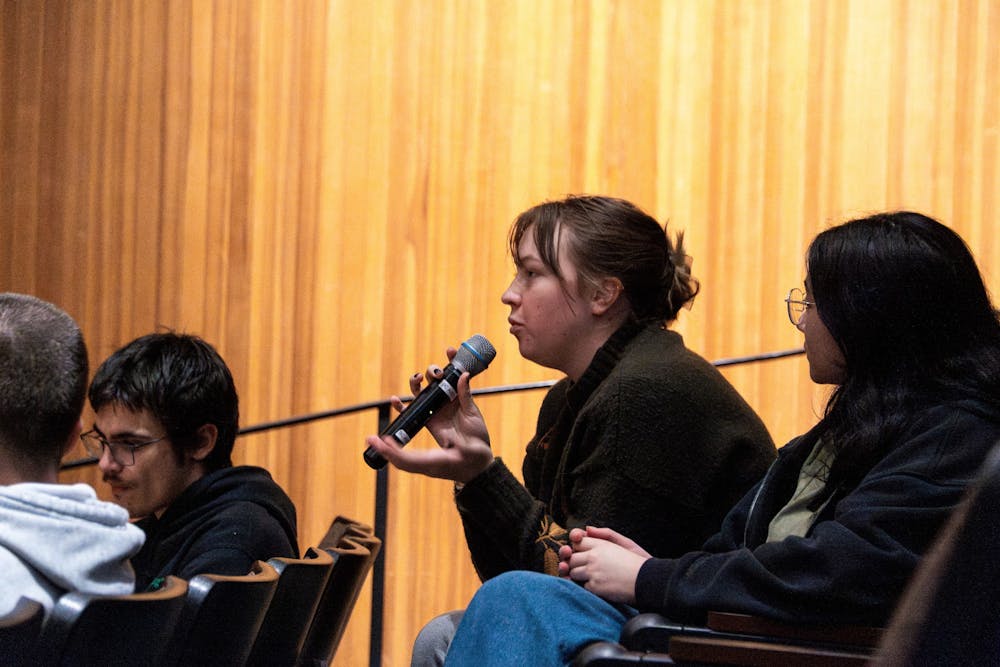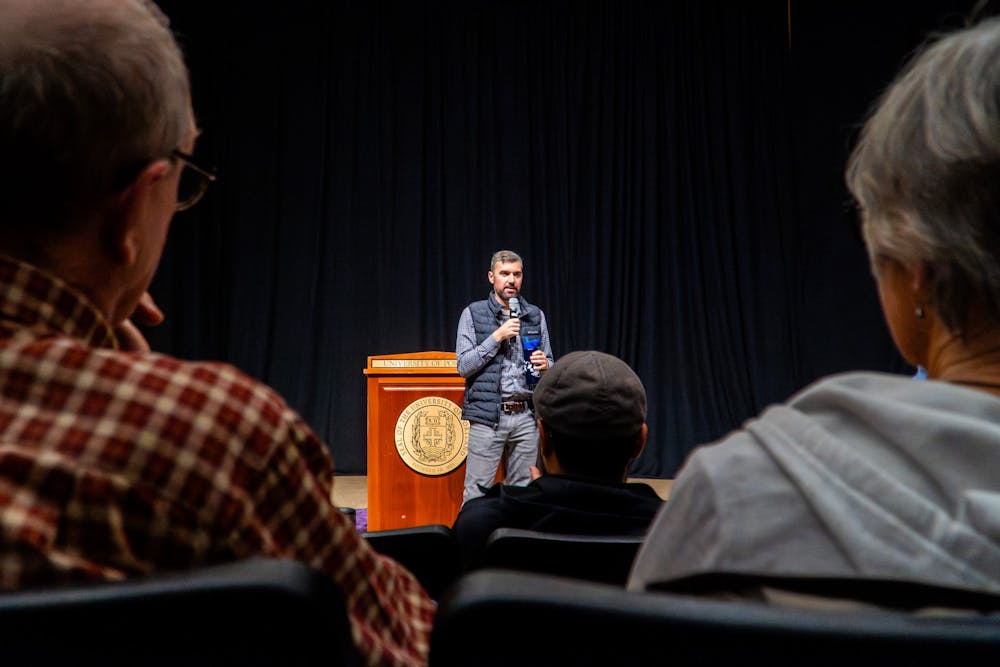Pulitzer Prize-winning journalist Eli Saslow describes his work as masonry, with people as the foundation of his writing.
In his journalism, books and screenwriting, Saslow takes the country’s big issues and builds a holistic picture of how they impact individual lives.
Or as his 14-year-old daughter puts it, he writes “sad, long stories.”
As this fall’s Schoenfeldt Distinguished Writer, UP welcomed Saslow to The Bluff on Nov. 13 for a full day of literary events. The visit included an intimate lunch with faculty, staff and students, a campus-wide Q&A and lecture on the writing process for his book “Rising Out of Hatred: The Awakening of a Former White Nationalist.”
“I take these big things that are happening — immigration crises, the opioid epidemic, political polarization — and I try to figure out ways to write about people who are experiencing these things in really acute ways,” Saslow said at the event. “But really the heart of my work is trying to build trust with people so that I can spend huge amounts of time with them as they're experiencing some of these things in their own life.”
“Rising Out of Hatred” chronicles the transformation of Derek Black, who began college as the apparent heir to the white nationalist movement before disavowing the ideology.
While researching for a different story, Saslow encountered Black’s story on Stormfront, the first major white supremacist hate site.
Cara Hersh, English professor and assistant provost for undergraduate scholarly engagement, introduced Saslow at the lecture. As a professor, Hersh appreciates how Saslow’s telling of Black’s college experience documented the impact education had on his “ideological metamorphosis as an American citizen.”
She said at the event that Saslow’s writing is increasingly relevant as we grapple with how to live in communities, like UP, where people hold diverse ideas and identities.

This is a characteristic of his work that many admired — at each of the events, at least one attendee asked a variation of the question, “How do you remain impartial when writing about such controversial topics?”
Saslow said the same thing every time: He doesn’t. As a human, how could he?
But as a journalist, while he doesn’t write with bias or opinion, he aims to evoke emotions in his readers, so he must feel those emotions too.
“I want to inform people, but I also want to make them feel things,” Saslow said. “If I'm working on a story and I'm like, ‘I'm so bored right now,’ that story would be terrible, right? I have to find something that makes me laugh, that makes me curious, that makes me hurt. Those are the things I'm looking for.”
Instead of thinking about impartiality, Saslow considers fairness. When reporting and writing a story, he asks himself, “Is it fair? Is it true?” He says asking these questions can be tricky in journalism because of the profession’s ethics. This means he must observe people’s lives without meddling, which can be challenging.
But to Saslow, his job is to make humans “three-dimensional.” While he can’t be an advocate for the person or the societal issues they are facing, he’s there to understand them and their situation. By revealing pieces of their lives, he hopes his readers empathize with experiences that are radically different than their own.
“It's easy to judge people in situations that you don't know very much about and that you have your own assumptions about,” Saslow said. “But I find in my own reporting, once I actually go out and spend time with people, it always complicates my assumptions.”

His “genuine curiosity,” rather than judgment, is how he combats coming into a story or interview with assumptions.
Ethan Zettler-Bray, a first-year public health and wellness major who attended all three Saslow events, resonates with this sentiment about curiosity.
“Talking about the idea of being genuinely curious, asking the right questions and having a deep understanding of how to storytell, those are things not just to be applied to journalism,” Zettler-Bray said. “They can be applied to all walks of life.”
From “Rising Out of Hatred,” the New College of Florida students's response to white supremacy on their campus gave Saslow hope for future change in our country. He identifies a similar engagement with challenging ideas within UP students as well.
“Part of what makes me feel hopeful is [how] you guys [are] showing up in these conversations today,” Saslow said at the lecture. “You guys are so curious, so engaged, so present in these conversations. That might sound like a small thing, but that's, I think, the biggest thing on our way back to beginning to understand each other.”
Kaylee Monahan is the Copy and Opinions Editor for The Beacon. She can be reached at monahan26@up.edu.








